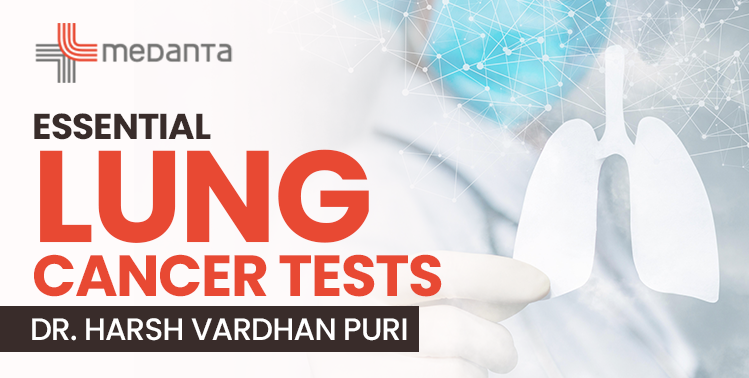CH Baktawar Singh Rd, Medicity, Islampur Colony, Sector 38, Gurugram, Haryana 122001

30 June, 2025
adminLung cancer remains one of the most prevalent and deadly cancers worldwide. Early detection is crucial for effective treatment and improved survival rates. Dr. Harsh Vardhan Puri, a distinguished thoracic surgeon with over 15 years of experience, emphasizes the importance of timely and accurate diagnostic tests in managing lung cancer. At his clinic, the Institute of Chest Surgery at Medanta – The Medicity, Gurgaon, patients receive comprehensive care, from diagnosis to advanced surgical treatments.
Lung cancer occurs when abnormal cells in the lungs grow uncontrollably, forming tumors. These tumors can interfere with normal lung function and may spread to other parts of the body. Symptoms often include persistent cough, chest pain, shortness of breath, and unexplained weight loss. However, these symptoms can be subtle and easily overlooked, making early detection challenging.
Accurate diagnosis involves a combination of imaging tests, laboratory analyses, and sometimes surgical procedures. Dr. Puri employs a multidisciplinary approach to ensure precise diagnosis and staging of lung cancer.
LDCT is the gold standard for lung cancer screening, especially for individuals at high risk, such as smokers or those with a significant smoking history. This test uses a lower dose of radiation compared to standard CT scans, making it safer for repeated use. Studies have shown that LDCT can detect lung cancer at earlier, more treatable stages, significantly improving survival rates .
While not as detailed as LDCT, a chest X-ray is often the first imaging test performed when lung cancer is suspected. It can reveal large tumors, fluid accumulation, or other abnormalities. However, it may not detect small or early-stage cancers .
This test involves examining mucus (sputum) coughed up from the lungs to check for cancer cells. It is particularly useful for detecting cancers in the central airways. However, its sensitivity is limited, and it may not detect cancers located in other parts of the lungs .
A biopsy is the definitive method for diagnosing lung cancer. It involves removing a small sample of tissue from the lung or a suspicious area for laboratory analysis. There are several types of biopsies:
A PET scan uses a small amount of radioactive material to detect areas of increased metabolic activity, which can indicate cancer. When combined with a CT scan (PET-CT), it provides detailed information about the location and spread of cancer .
MRI scans are particularly useful for detecting metastasis to the brain or spinal cord. They provide detailed images of soft tissues and can help in staging the cancer .
If there is fluid accumulation around the lungs (pleural effusion), thoracentesis may be performed. This procedure involves removing a sample of the fluid to check for cancer cells and relieve symptoms like shortness of breath .
Emerging research is exploring the use of blood tests to detect cancer-related genetic material. CTCs are cancer cells that have shed from the primary tumor into the bloodstream, while ctDNA refers to fragments of DNA released by cancer cells. These tests are still under investigation but hold promise for non-invasive cancer detection and monitoring .
Early-stage lung cancer often presents with few or no symptoms, making regular screening vital for high-risk individuals. Detecting cancer at an early stage allows for more treatment options and better outcomes. Dr. Puri advocates for regular screenings and prompt evaluation of any concerning symptoms to catch lung cancer early.
At the Institute of Chest Surgery, Dr. Puri offers a comprehensive range of services for lung cancer patients:
Dr. Puri’s extensive experience and commitment to patient care make him a leading choice for individuals seeking treatment for lung cancer.
Lung cancer is a serious condition that requires timely and accurate diagnosis. Through advanced diagnostic tests and a personalized approach to treatment, Dr. Harsh Vardhan Puri provides comprehensive care for lung cancer patients. If you or a loved one is at risk, consider scheduling a consultation to discuss screening options and preventive measures.
Category : Lung Cancer
Tags: